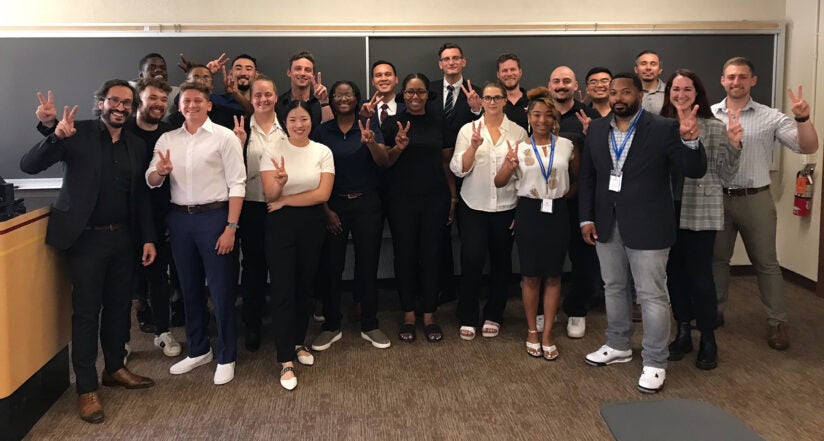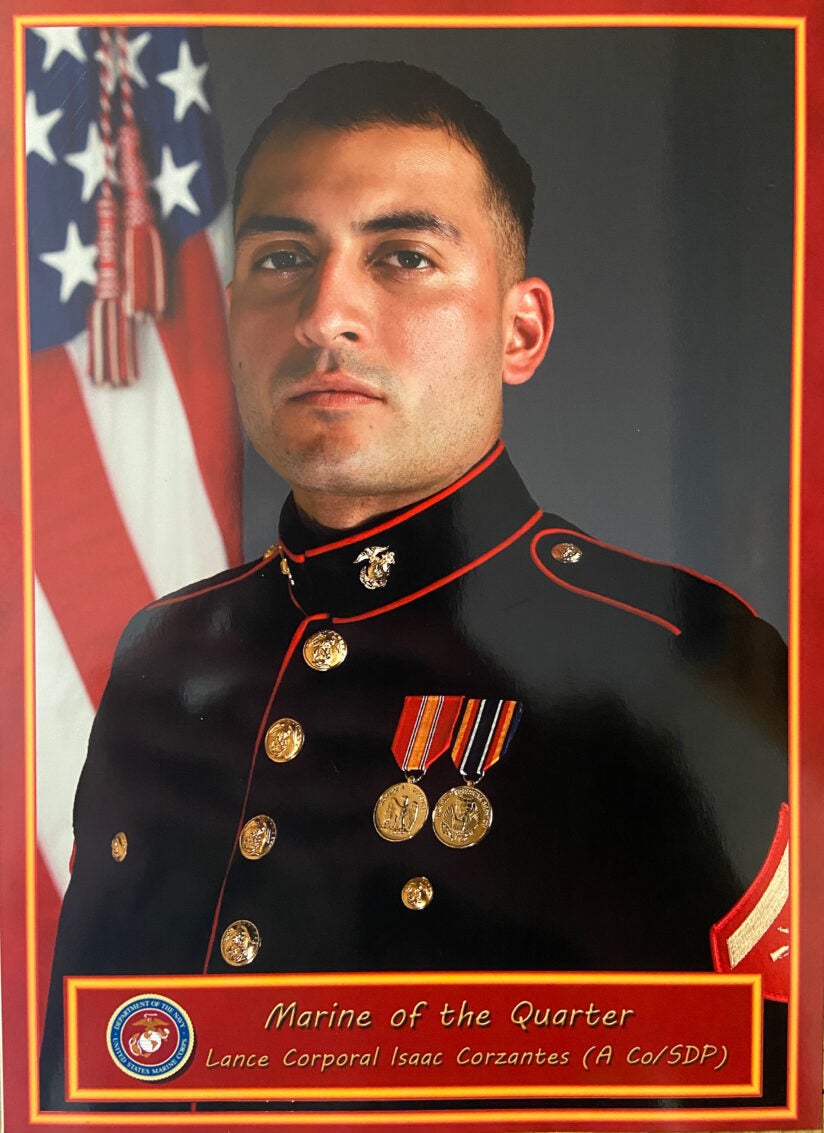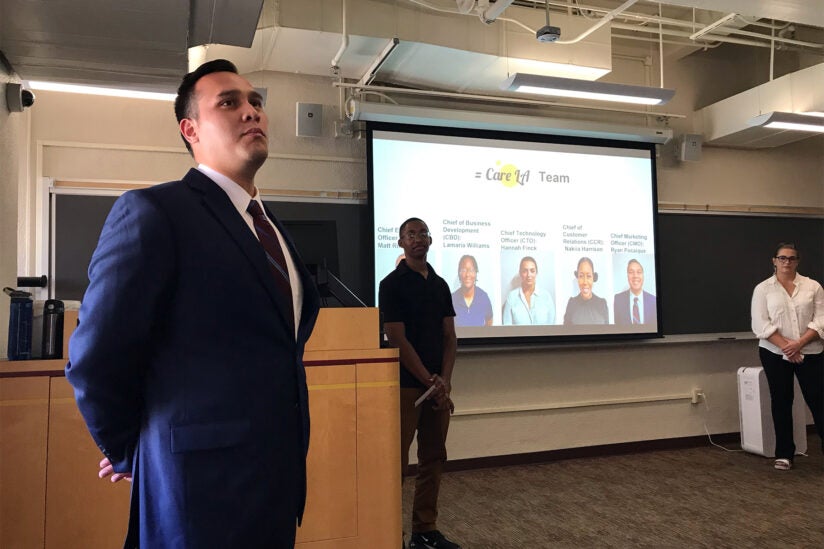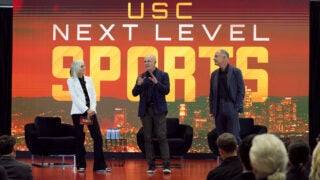USC’s Warrior Scholar Project puts service members on the front line in the classroom
The college preparatory program helps prepare veterans and transitioning service members to succeed in higher education.
United States Marine Isaac Corzantes swapped his uniform for a textbook and his rifle for a pen to join USC’s Warrior Scholar Project.
The college-preparatory academic boot camp helps veterans and transitioning service members to succeed in higher education.
“It was absolutely what I was hoping for,” Corzantes said. “Thankfully, I have great organizational skills due to the military, which really pays off dividends when trying to get through a crash course of an entire semester in two weeks.”
The first week of the August program offers a humanities boot camp, which includes daily seminars taught by USC professors who are leaders in their field. There are readings and analyses of challenging texts and discussions in preparation for seminars, writing workshops and other assignments.
The second week of the academic boot camp is the business and entrepreneurship program, which prepares students for the demands and challenges of a business-related undergraduate degree program with a focus on entrepreneurship. USC was the first university to offer the business and entrepreneurship week, a program from co-creator Farzin Samadani, who teaches at the USC Viterbi School of Engineering and the USC Marshall School of Business.

“I know this program adds great value,” Samadani said. “I can see the warrior-scholars are different people than who they were a week ago. They have gained soft skills, confidence and understand that higher education is not out of reach. This is the ultimate goal of our program, and we are proud of the outcomes of every cohort.”
Helping veterans succeed in business and entrepreneurship
Shahla Fatemi, director of Military & Veterans Iinitiatives for the USC Provost’s Office, co-developed the business and entrepreneurship week with Samadani.
“We said, let’s make it entrepreneurship-heavy and build in those business core curricula within that thread.” Fatemi said. “I think people forget that small programs are very impactful because, in this veteran community, word of mouth is key.”

Marine Corzantes agrees. He heard about the Warrior Scholar Project from a military buddy.
“I figured this program would be a deciding factor for me — whether I wanted to continue working or pursue higher education,” Corzantes said. “I was especially looking forward to the business week.”
The business curriculum is a fusion of core business skills, theory seminars and workshops, including accounting, finance, business operations, business communications, leadership, organization and management. In addition, it includes experiential learning experiences and an entrepreneurship curriculum that culminated in a showcase of mock startup business pitches.
Warrior Scholar Project student Lamaria Williams, who is still serving in the U.S. Army in Fort Sill, Okla., pitched a mock startup business called Equal Care LA. The proposed app was aimed at helping undocumented individuals in Los Angeles to sign up for health insurance.
Williams said the business course taught her how to pitch a startup — and something else that was unexpected.
“Most people want to start a business because it’s something they like,” Williams said. “But this course has really shifted my perspective to realize how important it is to know the needs of the customers and solve real-world issues. That’s the real success.”
USC Warrior Scholar Project in its eighth year
This is the eighth year of USC’s Warrior Scholar Project, which gives vets the skills and confidence to consider top-rank schools for their higher education.
Confidence was key for Williams.
“Once you take the uniform off, it’s like, ‘Who am I now?’” Williams said. “But being here, it lets you know that you are not alone. It can seem intimidating if you don’t believe you have a place there, but you do. It’s extremely possible and attainable if you work hard enough for it, strive for bigger goals.”

After completing the two-week program, Ryan Pocaigub of the U.S. Coast Guard reserve — a full-time student pursing an associate degree at a state school in Florida — said he is more confident to pursue a higher education at a top-tier university.
“I woke up every day looking forward to the next day,” Pocaigub said. “I’m so thankful for the University of Southern California for having us here, our advisers of the program, and everyone who has helped us with our future. I would recommend the WSP. It has changed my life.”
Quality teaching key to USC Warrior Scholar Project
Adonia Tolbert, a retired sergeant from the U.S. Army, said the Warrior Scholar Project at USC was incredibly impactful because of the exceptional quality of the teaching. She was especially impressed by instructor Samadani.
“He was the driving force, the cheerleader. He was just the best; most parents don’t even give you that kind of encouragement,” Tolbert said. “I’ve never seen anything like it. It changes the way you see things: When you start to see things differently, the world starts to open up to you, and when you see it as closed, it closes to you. It just solidifies be open and things will be open to you.”
USC was the first West Coast institution to join the national Warrior-Scholar Project. It made an attractive component to Arizona service member Alexander Bilochenko, who finished his military service just a week before the start of the program. He said he could have taken off the two weeks prior to beginning his first year at the University of Chicago, but he wanted to take advantage of the military to higher ed transitional skills being offered at the USC.
I really believe in the American dream. Part of that is making yourself better and, therefore, the country better and better.
Alexander Bilochenko, Warrior Scholar Project alumnus
“I’m originally from Ukraine and I really believe in the American dream,” Bilochenko said. “Part of that is making yourself better and, therefore, the country better and better.”
The Warrior Scholar Project boasts proven success rates: 90% of alumni recently surveyed reported they were on track to complete a college degree, and 32% were enrolled in or had graduated from a top 20 institution. Seulki Noh, who currently serves as the student president of the Veterans Association at USC, is a 2020 alumna the project and an example of what it can do for veterans.
“I served 4½ years in the Army and I got really useful information from WSP,” Noh said. “Now, I’m a senior at USC Marshall School of Business and I want to spread the word to all my fellow veterans out there to get involved with WSP because you’ll love it.”
Learn more on the USC Warrior Scholar Project website.



